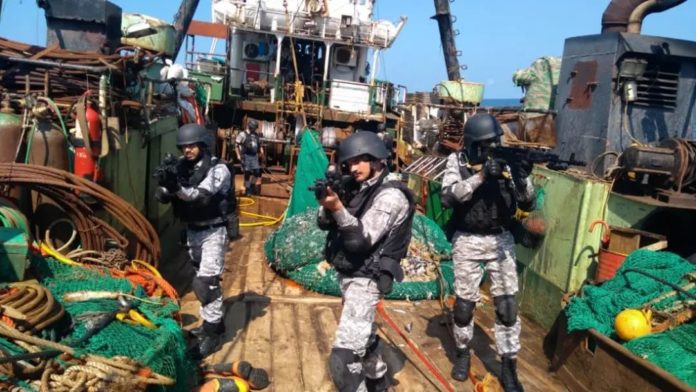In the vast waters of the Indian Ocean, where illicit networks exploit unregulated spaces to traffic drugs, arms, and endangered marine species, the Indian Navy stands as a robust bulwark against maritime crime. By leveraging cutting-edge technology, strategic partnerships, and persistent vigilance, the Navy has emerged as a key force in securing India’s maritime borders and shaping regional stability.
A Strategic Battle Against Trafficking and Smuggling
The Indian Ocean serves as a critical transit corridor for global narcotics and arms smuggling, with routes emanating from the Makran coast and elsewhere in South Asia. In March 2024, a joint operation between the Indian Navy and the Narcotics Control Bureau resulted in the seizure of over three tonnes of illegal drugs—a record interception showcasing the Navy’s capacity to disrupt international drug cartels.
Equipped with advanced maritime surveillance assets such as the P-8I Poseidon aircraft and MQ-9 Reaper drones, the Navy identifies and tracks suspicious vessels over expansive territories. This technological edge was evident in January 2024, when intelligence-driven patrols led to the seizure of smuggled arms in the Andaman Sea. These operations highlight the Navy’s strategic role in dismantling smuggling networks that fund organised crime and terrorism.
Protecting Marine Ecosystems from Illegal Fishing
Illegal, Unreported, and Unregulated (IUU) fishing remains a pressing issue in the Indian Ocean, depleting marine biodiversity and threatening coastal livelihoods. In response, the Indian Navy has increased its surveillance over India’s Exclusive Economic Zones (EEZ) near Lakshadweep and the Andaman and Nicobar Islands, regions particularly vulnerable to illegal poaching.
Collaborating with the Coast Guard, the Navy enforces stringent fishing regulations under frameworks such as the National Fisheries Policy. Operations targeting poaching have disrupted illicit trades in high-value species like sea cucumbers, which are frequently trafficked to lucrative markets in Southeast Asia. These efforts preserve marine resources and reinforce India’s ecological commitments.
Building Resilience Through Surveillance
The 2008 Mumbai attacks highlighted vulnerabilities in India’s maritime security, prompting the establishment of an integrated coastal defence system. This includes advanced radar networks and the Automatic Identification System (AIS), which tracks vessel movements along India’s extensive coastline. The result is a robust framework capable of identifying and neutralising threats in real time.
Central to this strategy is the Information Fusion Centre-Indian Ocean Region (IFC-IOR) in Gurugram. The centre acts as an intelligence hub, sharing data with over 20 nations to preempt maritime threats. This cooperative approach enhances the Navy’s ability to act swiftly, as seen in operations targeting narcotics and weapons trafficking across the IOR.
Regional Collaboration for Collective Security
The Navy’s success is also rooted in international cooperation. It actively engages in forums like the Indian Ocean Rim Association (IORA) and the Indian Ocean Naval Symposium (IONS), facilitating collective responses to shared threats such as piracy and trafficking. Bilateral and multilateral exercises, including Malabar and Coordinated Patrols (CORPAT) with regional partners like Sri Lanka, Maldives, and Bangladesh, ensure interoperability and mutual trust.
Partnerships with global institutions, including the United Nations Office on Drugs and Crime (UNODC), further amplify India’s efforts. These collaborations focus on combating human trafficking and environmental crimes, enhancing India’s standing as a responsible maritime power.
Preparing for the Future
As maritime threats evolve, the Indian Navy is modernising its fleet and operations. Plans include integrating AI-driven surveillance systems, unmanned platforms, and advanced sensors to enhance situational awareness. With these developments, the Navy aims to strengthen its ability to tackle increasingly complex challenges across the Indian Ocean.
A Stabilising Force in the Region
The Indian Navy’s proactive approach to combating smuggling, trafficking, and IUU fishing stresses its critical role in maintaining stability in one of the world’s most vital maritime regions. Through its technological capabilities, regional partnerships, and commitment to maritime security, the Navy protects India’s interests and contributes to a secure and prosperous Indian Ocean. As geopolitical tensions rise, its presence remains indispensable to peace and stability in the region.

